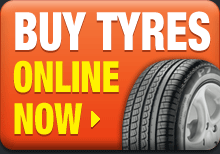Tyre FAQs
Find the answers to any tyre related queries you may have with our helpful tyre FAQs page!
Purchasing Tyres
- When Do I Need New Tyres?
-
Tyres wear with use and age so you will need to get them replaced, however, the rate of wear depends on a number of factors so there is no specific timeframe for having them replaced. You should instead replace your tyres if:
- Tyre tread has dropped below 3mm
- The tyre shows signs of damage
- There are cracks on the tyre
- The tyre has been deemed irreparable by a tyre specialist
- How Do I Choose New Tyres?
- Choosing new tyres can be stressful when there is so much choice! To ensure that you select the best new tyres for your vehicle you should first make sure that they are the right size. You can find the tyre size your vehicle requires in the manufacturer handbook. You should then consider what you expect from your tyres – high performance or the best economy for example – and select the tyres which best suit your needs.
- Can I Use Part Worn Tyres?
- While fitting part worn tyres to your vehicle is not illegal, this practice is unsafe and The Tyre Group would not recommend using part worn tyres. 98% of part worn tyres are sold illegally and do not meet legal safety standards, posing a risk to you and your passengers. Find out more about part worn tyres.
- What’s the Difference between Budget and Premium Tyres?
- Created with more expensive materials and subject to meticulous research and testing, premium manufacturer tyres provide higher levels of performance and safety than budget tyres and this is reflected in their respectful price tags. While budget tyres are manufactured to meet UK safety requirements by law, they will not be able to match the performance offered by a premium tyre. Learn more about budget and premium tyres.
- What Different Types of Tyre Are There?
-
Tyres are constructed to meet specific demands, so there is a huge range of different tyre types to choose from. There are tyres created for different vehicles such as cars, 4x4s or vans and tyres constructed specifically to provide enhanced safety in different seasonal conditions.
In addition, tyres are designed to best suit the purpose of the driver. High performance tyres provide exceptional handling characteristics and precise steering for dynamic drivers and energy efficient tyres work to reduce rolling resistance for lower fuel consumption and emissions.
Tyre Safety
- When Is Tyre Tread Illegal?
- When tyre tread drops below 1.6mm your tyres are illegal and will need to be replaced as soon as possible. If you are found to be driving on tyres with tread below this legal limit you can face three penalty points on your licence and a fine of £2,500 per illegal tyre. Don’t take the risk - learn how to check your tyre tread.
- What Should My Tyre Pressures Be?
- Keeping your tyres correctly inflated is vital for your safety on the road. The correct tyre pressure you require is specified by your vehicle manufacturer and can be found in your vehicle handbook, on your fuel cap or on the inside rim of the driver or passenger door of your vehicle. Find out more about maintaining the correct tyre pressure.
- How Often Should I Check My Tyres?
- You should thoroughly check your tyres every three weeks for any signs of damage and to ensure that your tyres are correctly inflated and your tyre tread has not dropped below the legal limit of 1.6mm.
- What Signs of Tyre Damage Should I Look Out For?
-
When visually inspecting your tyres you should keep an eye out for the following signs of damage:
- Cuts and tears
- Lumps and bulges
- Cracks
- Irregular wear
- Foreign objects embedded in the tyre
Tyre Fitting
- Where is My Nearest Tyre Fitter?
- The Tyre Group have branches located throughout the Midlands, South West England, South Wales and Scotland for you to choose from. Find your nearest Tyre Group branch.
- Can I Have My Tyres Fitted at Home?
- The Tyre Group offer a mobile tyre fitting service in selected areas to help our customers save time and money.

























